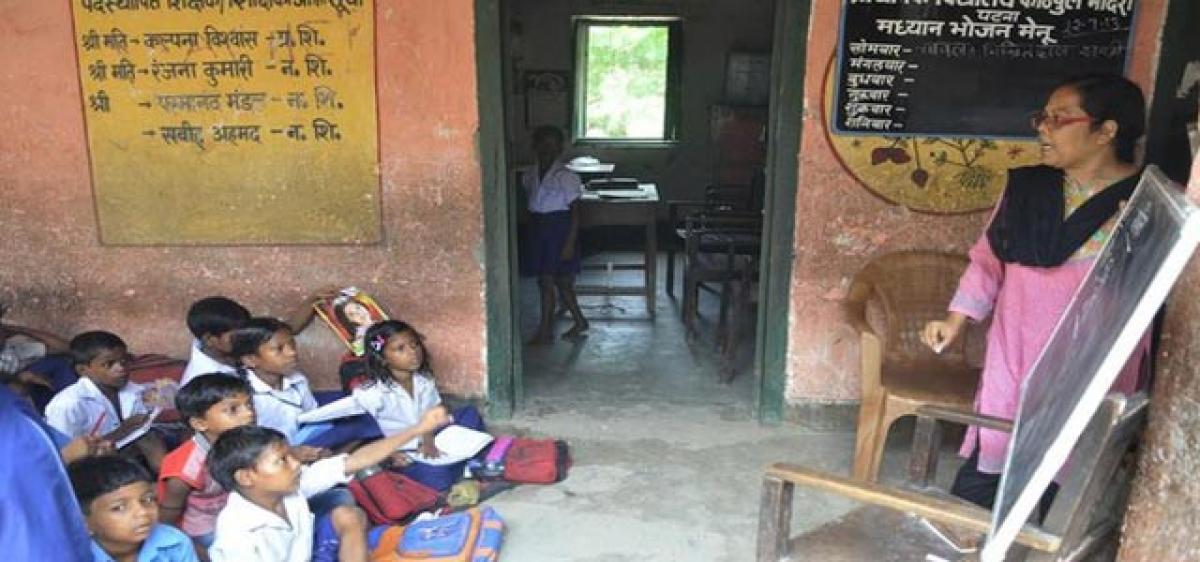Live
- Genome sequence of critically endangered Australian fish to boost conservation efforts
- Haryana taught lesson to Congress, rejected 'Jumlebaazi': Giriraj Singh
- Centre clears appointment of three advocates as Gujarat HC judges
- Haryana polls: BJP workers begin celebrations in Gurugram
- Pawan Kalyan Condemns Pithapuram Rape Incident, Promises Support for Victim
- Ola, Uber, Porter provide zero working conditions for gig workers: Report
- Amid BJP's likely hat-trick in Haryana, PM Modi's old picture from a poll rally emerges
- Kerala CM brings in no-nonsense top cop P. Vijayan as Intel wing head
- Thaman hints for delay of ‘Game Changer’ teaser
- Record 12.3 pc increase in AUM of mutual funds industry in July-Sep
Just In

It has been nearly five decades since the first National Policy on Education (1968) was framed.
It has been nearly five decades since the first National Policy on Education (1968) was framed. A committee constituted in October 2015 by Government of India, headed by former cabinet secretary TSR Subramanian for evolution of the National Education Policy (NEP-2016), submitted its report to MHRD on 27th May 2016. This report was not made public. Instead, interestingly, a document titled “Some inputs for the draft New Educational Policy” was posted all of sudden on the MHRD website seeking suggestions from people and organisations, by September30.
The 43-page document is a prototype of a new education policy, covering all levels of general education, right from pre-primary to research. Though hardly any new finding other than those recommended by earlier Education Commissions is apparent in the document, the suggested policy initiatives are counter-productive to its recognition of education as the most potent tool for socio-economic mobility, for building an equitable, just and human society, promoter of social cohesion and national identity, and facilitator for amalgamating globalisation and localisation.
NEP-2016 is supposed to provide a framework for the development of education in India over the coming several years. It chooses to continue addressing the unfinished goals and targets set in the previous policies on education along with the current and emerging new challenges.
Although the document seems to have rightly identified the pre-school education, as a universally accepted imperative for child’s mental and physical development, assurance to provide pre-school education as a part of school education under the same ministry for all children between 0-6 years, with constitutional or legislative guarantee, is most desirable.
The document erroneously diagnoses the existing non-detention policy as the reason for the poor learning outcomes in elementary education and proposes restoration of detention policy which punishes largely the students of disadvantaged groups for the failures of education system. Besides, the proposed open school system at elementary level pushes up the early drop-outs, legitimizing child labour. On-demand board examinations like Part-A and Part-B exams in Class-X, conveniently ward off the students of underprivileged sections. Students at that level are not mature enough to make decision as to what to do after Class X. Nevertheless, all students must be delivered quality education up to Class X.
Irony is quoting of Swami Vivekananda as saying that, “education is not the amount of information put in brain,” on one side, overstating information and communication technology (ICT) on the other side. It is particularly menacing when the document says ICT is to be used for remedial education, teacher training, adult literacy and skill education. ICT can never be a substitute for either a well-trained teacher or a highly skilled instructor. Haphazard use of ICT anywhere ruins the purpose rather than energise it.
The highly deplorable perception of the purpose of school education as making student job-ready brings forward the idea of creation of skill schools, skill development programmes. There are no jobs for already vocationally, professionally trained students. The difference between importance of ‘English-as-a-communicative language’ and significance of ‘English-as-a-medium of instruction’ up to a certain class is to be unambiguously distinguished. The document proposes that those states and UTs which so desire may provide primary education in mother tongue, otherwise any (English) medium they can opt for.
What stops the government from making mother tongue as the medium of instruction up to a certain level? Curricular and procedural reforms of the policy alone do no help realise the objectives of education. They ought to be augmented with proper support and delivery system ic action, and continuous monitoring and spirited review with time-bound feedback analysis. (Writer is an Assistant Professor at Kakatiya Government College, Hanamkonda)
By Bairy Satyanarayana

© 2024 Hyderabad Media House Limited/The Hans India. All rights reserved. Powered by hocalwire.com







